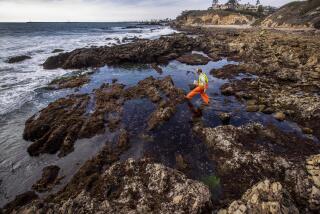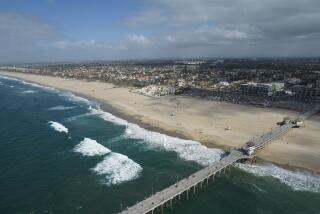Three Major Oil Spills Hit U.S. Within 13 Hours
- Share via
NEWPORT, R.I. — Major oil spills threatened Rhode Island, Delaware and Texas on Saturday after three shipping accidents in just over 12 hours unleashed an estimated 2.55 million gallons of oil.
The extraordinary sequence of events began Friday afternoon in Narragansett Bay, not far from fashionable Newport, when the Greek-registered tanker World Prodigy ran aground on Brenton Reef, tearing holes in the vessel and releasing up to 1.5 million gallons of light heating oil into the bay, the Coast Guard said.
800,000 Gallons
About 12 hours later, as much as 800,000 gallons of oil--heavy No. 6 crude--oozed into the Delaware River after the Uruguayan-registered Presidente Rivera ran aground near the town of Claymont, upriver from Wilmington.
Sandwiched between those huge spills was the estimated loss of 250,000 gallons of heavy crude oil that dumped into the Houston Ship Channel near La Porte, Tex., late Friday when a tug-driven barge was punctured and lost its load after colliding with a Panamanian-registered tanker.
Unlike the situation in Valdez, Alaska, where 11 million gallons of crude oil were spilled in the grounding of the Exxon Valdez on March 24, government and environmental workers moved quickly in an effort to combat all three spills.
The White House, which had been criticized for its slow response to the Alaska disaster, dispatched William K. Reilly, administrator of the Environmental Protection Agency, and Manuel Lujan Jr., secretary of the Interior, to survey the scene here shortly after midnight, only hours after the 4:30 p.m. accident.
By Saturday, emergency crews in New England were working to prevent major environmental damage, but ribbons of heating oil befouled 20 beaches and coves in Rhode Island Sound during the day, forcing officials to close beaches and shellfishing beds.
Hundreds of workers scrambled to clean the flood of No. 2 oil that poured from the 560-foot Greek tanker after it hit a reef marked by an 87-foot light tower only a mile from this famed resort town.
Criminal, Civil Charges
State officials said they expect to file criminal and civil charges against Iakova Georgudis, the captain of the World Prodigy, and the ship’s Athens-based owner.
Rhode Island Gov. Edward DiPrete said the tanker had entered the busy Narragansett Bay harbor without a pilot, in violation of state law. He told reporters the captain “acknowledged an error in course adjustment” while turning the tanker.
“He said, ‘I made a mistake,’ ” DiPrete said after interviewing the captain. “I said, ‘A very serious mistake and a lot of people are paying for it.’ ”
Georgudis showed no signs of being under the influence of alcohol or drugs when questioned by officials, a Coast Guard spokeswoman said in Boston.
Crews moved to surround the ship with about 3,000 feet of booms. Other absorbent booms were set to protect sensitive salt marshes and coves on Narragansett Bay. Crews used dozens of trucks and boats to skim pools of oil from the water.
Complaints of Fumes
Tourists who flock here to visit the 70-room summer “cottages” of John Jacob Astor and Cornelius Vanderbilt instead took pictures of the crippled tanker. Many complained of the noxious fumes that permeated the town Friday night, but every Newport hotel was full Saturday night.
Officials said the spill was far less serious than the one off Valdez three months ago that killed thousands of birds and other wildlife and fouled hundreds of miles of coastline with a heavier type of oil.
Affected beaches here were not blackened, but had a thin, oily sheen near the water’s edge. More important, the No. 2 oil floats on the surface and evaporates quickly.
“This oil is very much like gasoline,” said Coast Guard Chief Warrant Officer Rick Meidt. “The scientists say 80% to 90% will evaporate within three days.”
‘Disappears Rapidly’
Gary Ott, a federal science support coordinator, said the oil would evaporate as it washed in and out of the bay on the tide. He said the oil is “much more toxic” than in the Alaskan spill, but “fortunately it disappears incredibly rapidly.”
“The best thing that could happen now is a couple of days of hot sun to help it evaporate, and then heavy rains to break up the rest,” he said.
Trude Coxe, head of the Save the Bay environmental group, said she knew of only one oil-fouled bird. “It could be a lot worse,” she said. “Because the Coast Guard moved so quickly, they prevented this from being a real disaster.”
Gov. DiPrete said the state was using 250 state employees and 120 inmates from the state prison to help clean up. He also ordered a part mobilization of about 200 members of the Rhode Island National Guard.
Industrial Area
A spill of similar proportions hit the Delaware River off Claymont, Del., early Saturday morning in an industrial area where many oil refineries and chemical plants line the river banks. The Coast Guard had estimated the spill as large as 1.6 million gallons, but later lowered the figure.
The oil, moving with the tide, stretched for 15 miles along the Delaware shore. Because it was No. 6 oil, used for industrial heating, it solidified into globs and began to sink below the surface, rather than forming a slick.
Two private contractors were hired by the ship’s owners to contain the spill and remove the oil from the water. By midday Saturday, there were nine vessels involved in the cleanup, the ship was surrounded by oil booms and its remaining cargo of oil was being transferred to barges.
“The fortunate thing is that this oil is not toxic and is not soluble in water,” said James Weakley, a marine safety officer at Coast Guard headquarters in Philadelphia. “The impact on fish and shellfish will be minimal. There is some risk to waterfowl if they get entangled with the oil globs.”
Investigation Starts
The Presidente Rivera went aground in the Delaware River at 4:46 a.m. A river pilot aboard the vessel notified the Coast Guard of the accident. An investigation was launched by the Coast Guard to determine why the 749-foot tanker, carrying about 18 million gallons of oil to Sun Co., at Marcus Hook, Pa., south of Philadelphia, strayed from the shipping lane and went aground, Weakley said.
It was the fourth major spill in the Delaware River area since 1985, the Coast Guard spokesman added.
The third spill, which temporarily closed the busy Houston Ship Channel, occurred at 6:20 p.m. Friday when a barge loaded with 6,000 barrels of crude oil collided with the Panamanian-registered tanker Rachel-B near Houston. The channel connects Galveston Bay and Houston.
Coast Guard Chief Mark Kennedy said favorable winds pushed most of a two-mile-long oil slick into the ship channel, which was making cleanup efforts easier. Some oil washed up on a little-used beach in the La Porte industrial area, he said.
‘Not Pristine’
“It is not a pristine area,” he said.
Lois Epstein, an environmental engineer with the Environmental Defense Fund in Washington, said she was not surprised by the rising number of oil spills since the total use of oil and transportation of oil were rising rapidly.
“An analogy would be that if there are more cars on the road, driving more miles, you’re going to have more (auto) accidents,” she said. Bob Drogin reported from Newport, R.I., and William J. Eaton reported from Washington. Staff writer J. Michael Kennedy in Houston also contributed to this story.
More to Read
Sign up for Essential California
The most important California stories and recommendations in your inbox every morning.
You may occasionally receive promotional content from the Los Angeles Times.












